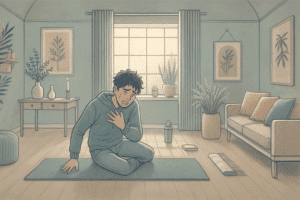Setting boundaries is a powerful way to take charge of your mental and emotional health. When you have strong boundaries, you’re telling the world, “This is who I am, and these are my limits.” Boundaries aren’t about shutting people out; they’re about carving out space for what truly matters to you, making room for the things and people that make you feel safe, supported, and energized. For teens, boundary-setting can be especially challenging but also incredibly rewarding. Learning to recognize when you need stronger boundaries and understanding how to set them can help you navigate relationships, school, family dynamics, and social media with more confidence and peace of mind.
Building boundaries takes courage and practice, but once you master it, you’ll be amazed at how much more in control of your life you’ll feel. Ready to learn the signs that it’s time for stronger boundaries? And how to create ones that stick? Let’s dive in.
Recognizing When You Need Stronger Boundaries
We all have different comfort levels, and boundaries help us protect those. But when your boundaries are weak or unclear, you might start to feel drained, resentful, or anxious without fully understanding why. Here are some common signs that it’s time to strengthen your boundaries:
- You Feel Overwhelmed After Certain Interactions: Do you feel anxious or emotionally exhausted after spending time with certain people or in specific situations? If you consistently feel this way, it may be because your boundaries are being crossed.
- You’re Constantly Saying “Yes” When You Want to Say “No”: When you feel pressured to say “yes” to things you’re not comfortable with — from favors to plans that don’t fit your schedule — it’s a good indication that stronger boundaries are needed.
- You’re Resentful Toward Others: Resentment often creeps in when we’ve let our own boundaries slide. If you’re feeling frustrated with people who seem to demand too much of your time or energy, this is your mind’s way of signaling that a boundary is missing.
- You’re Avoiding Certain People or Situations: If you’re going out of your way to dodge people or activities, it may be because they drain you or make you uncomfortable. It’s a clear sign that some protective boundaries could help.
How to Build Stronger Boundaries: Practical Tips
Setting boundaries doesn’t mean putting up walls; it’s about creating guidelines for how you want to be treated and what you need to thrive. Here’s how to start building boundaries that work for you:
1. Identify What You’re Comfortable With and What You’re Not
Before setting boundaries, you need to understand where your comfort levels lie. Reflect on situations where you’ve felt uncomfortable or stressed. Is it when a friend pressures you to hang out all the time? Or when family members push you into activities you’re not interested in? Write these down. The more specific you can be, the easier it will be to create meaningful boundaries around them.
2. Learn to Say “No” with Confidence
Saying “no” can feel hard, especially if you’re used to pleasing others or if you’re worried about what people might think. But a “no” is often necessary to protect your time, energy, and mental health. Practice saying it without apologizing, using phrases like “I’m not able to,” or “I need some downtime,” and remember that a simple “no” is sometimes all you need.
3. Use “I” Statements for Clear Communication
Instead of making statements that might come off as blaming, try to start sentences with “I.” This keeps the focus on your needs and helps prevent others from feeling accused. For example, instead of saying, “You never respect my time,” try, “I feel overwhelmed when I don’t have enough time to myself.” This way, you’re being honest while keeping things calm and constructive.
4. Set Boundaries with Social Media, Too
Social media can have a huge impact on how we feel about ourselves and our lives. If scrolling makes you feel down, compare yourself to others, or leaves you feeling overwhelmed, set boundaries for your online time. Consider muting accounts that don’t uplift you, setting screen time limits, or taking occasional breaks.
5. Stick to Your Boundaries Firmly
Boundaries can be hard for others to accept initially, especially if they’re not used to you setting them. It’s common for friends or family members to push back, but that doesn’t mean you should give in. If you’ve decided you won’t respond to texts during your homework time or that you need alone time after school, stick with it. Reinforcing your boundaries is part of ensuring they stay respected.
Tangible Takeaways for Boundary-Setting Success
Building boundaries isn’t just about saying “no.” It’s about taking active steps to create a life where you feel safe and respected. Here are some final, practical takeaways for making boundaries work for you:
- Start Small: You don’t have to overhaul all your boundaries at once. Begin with a single, small boundary — like saying “no” to extra plans on days you need rest — and build from there.
- Check In with Yourself Regularly: As you grow, your boundaries may need to change. Take time to reflect on what’s working and adjust where necessary. Boundary-setting is an ongoing process, not a one-time fix.
- Surround Yourself with Supportive People: Good friends and family members will respect your boundaries, even if it takes a little adjustment. Spend time with people who value you for who you are and respect your needs.
Embracing Boundaries as Part of Self-Care
Setting and maintaining boundaries is one of the most empowering steps you can take for yourself. It’s about more than just protecting your time; it’s about building a life where you feel free to be yourself without pressure or guilt. Remember, boundaries aren’t selfish; they’re essential for living a healthy, balanced life. When you prioritize your well-being, you’re better equipped to show up for the people and activities that truly matter to you.
Setting boundaries isn’t always easy, but each boundary you set brings you closer to a life filled with respect, trust, and genuine connection. And that’s a life worth protecting. So, give yourself permission to stand up for what you need — and watch how it transforms your confidence and peace of mind.





